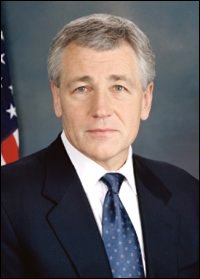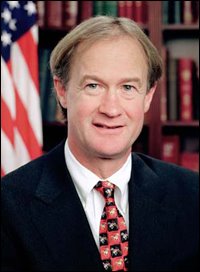Episcopal senators Hagel, Chafee recognized for leadership in Middle East peace


By Episcopal News Service staff
Tuesday, September 12, 2006
[Episcopal News Service] Two United States senators, Episcopalians Chuck Hagel(Republican-Nebraska) pictured right, and Lincoln Chafee (Republican-Rhode Island), pictured left, "are continuing to show extraordinary leadership" on the difficult issues surrounding recent developments in the Middle East, according to Maureen Shea, director of the Episcopal Church's Office of Government Relations.
Hagel and Chafee, who both serve on the Senate Foreign Relations Committee, have been independent voices and are raising significant points about the search for Middle East peace and the need for greater leadership by the United States, Shea said.
Shea's remarks were echoed by the Rev. Canon Brian J. Grieves, director of Peace and Justice Ministries for the Episcopal Church. "There's no doubt that a resolution of the Israel/Palestinian conflict will require serious and fair-minded engagement from the United States," Grieves said. "Senators Hagel and Chafee offer hope that sustained U.S. leadership by the Administration will receive support from important members of Congress."
Ina September 7 letter to Secretary of State Condoleezza Rice regarding the nomination of John Bolton as United States Ambassador to the United Nations, Chafee wrote: "It is no secret that I have serious questions about this Administration's policies in the Middle East. As we tackle enormous problems in the region, most notably with Iran and Iraq, I believe we need to be successful in forging alliances."
Senator Hagel, in a July 31 speech in Washington titled "A Defining Time for 21st Century American Leadership," said that the "core of all challenges in the Middle East remains the underlying Arab-Israeli conflict."
He warned "America is increasingly not seen as the well-spring of consensus that for decades helped create alliances and coalitions grounded in common objectives and common interests."
"America's approach to the Middle East must be consistent and sustained, and must understand the history, interests and perspectives of our regional friends and allies," Hagel continued.
Both senators are firm in their commitment to the State of Israel and its security, Shea said. Hagel noted our "special and historic" relationship with Israel but said that relationship "cannot be at the expense of our Arab and Muslim relationships… Achieving a lasting resolution to the Arab-Israeli conflict is as much in Israel's interest as any other country in the world."
Chafee, in his letter to Rice, made a similar point. "While I am a strong supporter of Israel, and believe her security is non-negotiable, we should have a more balanced approach -- so that both sides can see that we are an honest broker for peace," he wrote.
Shea commented that Hagel, a conservative Republican, has consistently questioned the Bush Administration on both the conduct of the war in Iraq and of its Middle East diplomacy. In Hagel's speech, much of which he later repeated on the Senate floor, he called upon President Bush and Rice to be "deeply engaged" in the Middle East and with both Syria and Iran.
"The Middle East need not be a region forever captive to the fire of war and historical hatred," Hagel said. "It can avoid this fate if the United States pursues sustained and engaged leadership worthy of our history, purpose, and power."
Chafee chairs the Senate Foreign Relations Subcommittee on Near Eastern and South Asian Affairs. He is considered a moderate to liberal Republican. His term ends this year and Cranston, Rhode Island, Mayor Steve Laffey is challenging Chaffee in the September 12 primary election for another term.
Like Hagel, he has held the Bush administration to account for its lack of forceful leadership on Middle East issues, Shea said. In his letter to Rice, Chafee referred to the Israeli government's recent announcement of expansion of West Bank settlements in Maale Adumim and Betar Illit, and asked, "Is this expansion of settlement activity a signal that holding both sides to their commitments under the Road Map is no longer official U.S. policy?"
The Episcopal Church has also sought more engagement by the Bush administration in the search for Middle East peace as the only way that both Israelis and Palestinians will ever be able to live side-by-side in recognized and secure states, Shea said.










0 Comments:
Post a Comment
<< Home